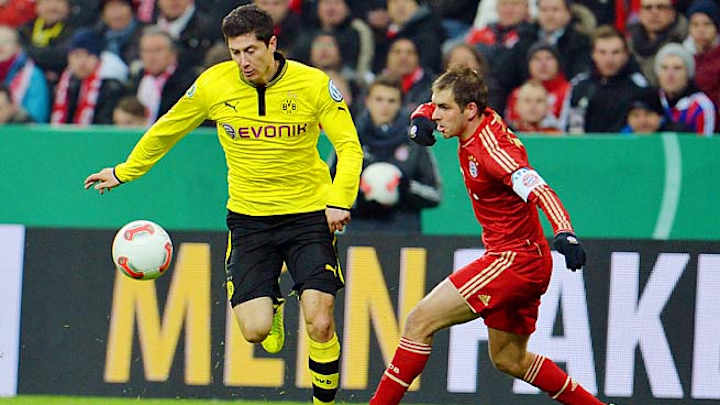Early look at what to watch in all-German Champions League final

Four early storylines going into the all-German Champions League final between Bayern Munich and Borussia Dortmund on May 25 at Wembley Stadium ...
1. The (future) ex-factor. Mario Götze, Dortmund's playmaker, is off to Bayern in the summer. Robert Lewandowski, Dortmund's center forward, has (off the record) agreed to join Bayern, either this summer (should Dortmund release him) or next. Götze is in a race to recover from a hamstring tear in time for the showdown in North London, but conspiracy theorists will have a field day if any of the two take the pitch. Will they have divided loyalties, can they be relied upon to give their all for their old team against their new ones?
There's a famous precedent, forever etched in the consciousness of German football. A young Lothar Matthäus had agreed to join Bayern from Mönchengladbach before the two sides met in the 1984 DFB Cup final. The game ended in a 1-1 stalemate after extra time. Matthäus, 23, stepped up to take Borussia's first penalty -- and blasted it over the bar. Bayern went on to win the shootout, and Matthäus has forever been suspected of missing on purpose.
The fact that there's no evidence to support this theory has not harmed its longevity. Matthäus gained nothing from missing, apart from an (undeserved) reputation as a big-game bottler. He most likely missed out on a huge winning bonus as well. Norbert Ringels, not Matthäus, missed the decisive penalty, and Bayern would have qualified for the UEFA Cup in any case.
Psychologically, it might be a difficult game for Götze and Lewandowski. But it's hard to fathom that either one will wittingly spur the chance to win a fairy-tale Champions League with Dortmund. Professional footballers are conditioned to live for the present, not the future or the past.
Perhaps another precedent is more instructive. Otto Rehhagel took his Werder Bremen team to Bayern Munich in the last game of the season in 1994/1995. The coach, set to switch sides in the summer, needed a win in the Olympiastadion to secure the championship. But Bayern, which had nothing at stake, was extremely motivated and steamrolled the visitors 3-1. Dortmund won the title.
2. Trouble out wide -- and in the center. Five out of Bayern's seven goals against Barcelona were created from the flanks, where Arjen Robben and Franck Ribéry operate. Bayern's wingers will be key to winning the final as well, since Dortmund is most vulnerable on the flanks. Lukasz Piszczek has been in remarkable form if you consider he's been nursing a hip injury that needs surgery in the summer, but Marcel Schmelzer on the left is clearly the weakest link in the team.
In the past, Dortmund has doubled up on the wingers and disrupted the supply lines. But Bayern has evolved to deal with these counter measures better. Dante's good technique allows him to play out of defense vertically when the wide players aren't open. And Dortmund's doubling opens up spaces in the middle that the free-roaming Thomas Müller, currently in the form of his life, and Mario Mandzukic, the hard-working striker, should be able to exploit.
The final piece of the jigsaw is Javier Martínez. The Spaniard provides protection for the back four; he'll be entrusted to stop Dortmund's quick transition attacks when Bayern loses the ball inside the opposition's half.
LYTTLETON: Dortmund takes dark-horse story to CL final
3. Psychology. There's a view that Bayern, in its third final in four years, has it all to lose; that all the pressure will be on Jupp Heynckes' team. A defeat would indeed be traumatic for the Reds -- they're fantastic achievements domestically and in the Champions League would be somewhat devalued if Borussia manages to pip them to the title they crave most.
But these are not the only considerations. Sometimes, playing with less pressure can be detrimental. In the all-Spanish final of 2000, Valencia was overwhelmed by the occasion; Real Madrid destroyed them 3-0. Germany keeper Jens Lehmann hinted that some of his teammates might have been so pleased to reach the Euro 2008 final that they didn't focus on winning the competition.
Bayern couldn't be more determined after two near misses in 2010 and 2012, however. Furthermore, its eagerness to put Dortmund back in its place domestically has been one of the key reasons for an unprecedented work rate and consistency this season. And after six games without a win against Jürgen Klopp's side, the 1-0 victory over the Black and Yellows in the quarterfinal of the DFB Cup in February has banished all talk of a "Dortmund complex."
On the contrary, the games suggested that Heynckes had finally worked out a way to deal with the opponents' pressing game effectively. As much as Dortmund will relish the underdog role and invoke the spirit of 1997, when it beat favorite Juventus in the Champions League final, Bayern goes into this with huge confidence and an unshakeable belief that this is its year.
4. Ilkay Gündogan vs. Bastian Schweinsteiger. Dortmund midfielder Gündogan, 22, has been in sensational form this season. After a couple of impressive performances with the national team, some pundits even felt moved to call him "the better Schweinsteiger" (Spiegel Online) and speculate about the end of the Munich player's reign at the center of Joachim Löw's team.
Schweinsteiger's performance in the DFB Cup win over Dortmund silenced his doubters, but Gündogan -- his younger, more mobile rival -- will pose a big challenge for the 28-year-old at Wembley. The ability of both men to skip challenges in midfield with a simple drop of the shoulder could well prove decisive in a game that will be fairly congested in the middle of the park. Both are also chiefly responsible for setting the tempo of their sides. If Gündogan gets the better of his counterpart, Dortmund will fancy its chances.
